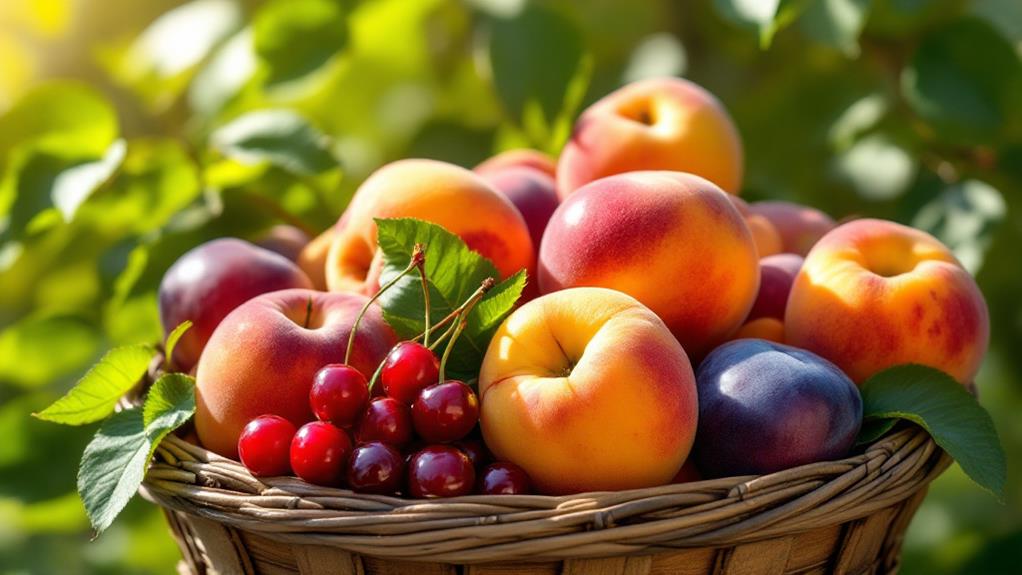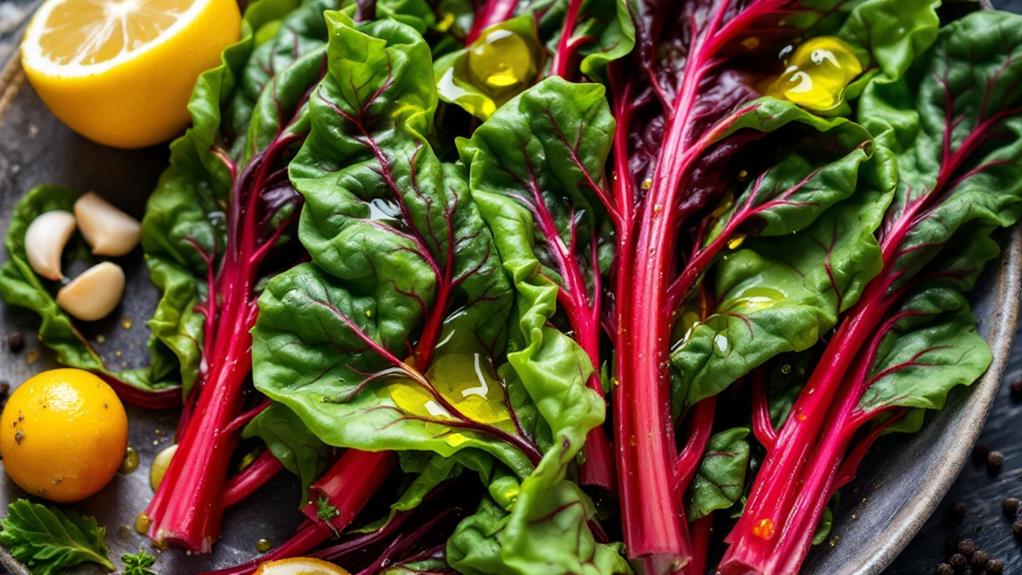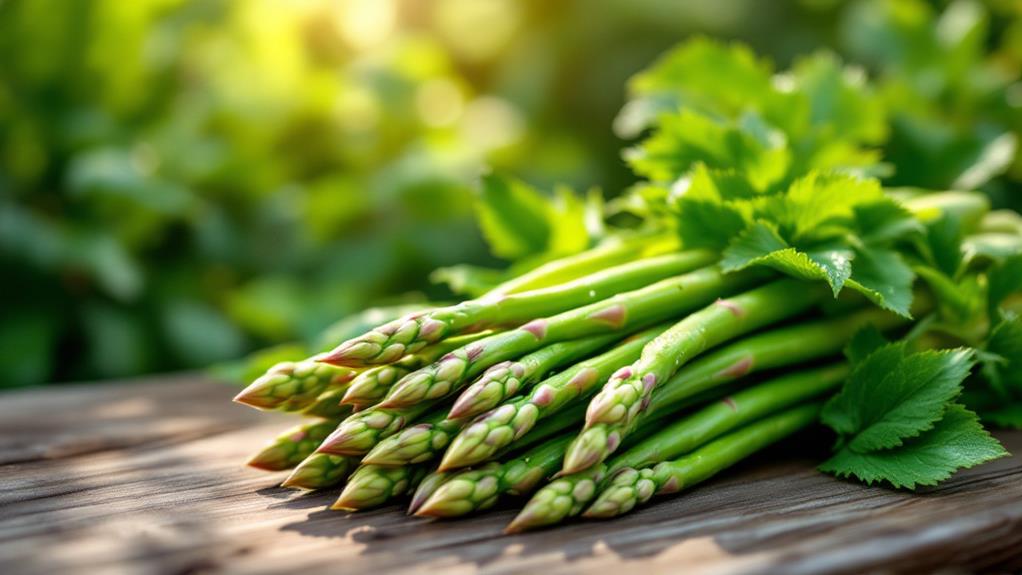The Best Fruits to Increase Fiber Intake in Your Diet
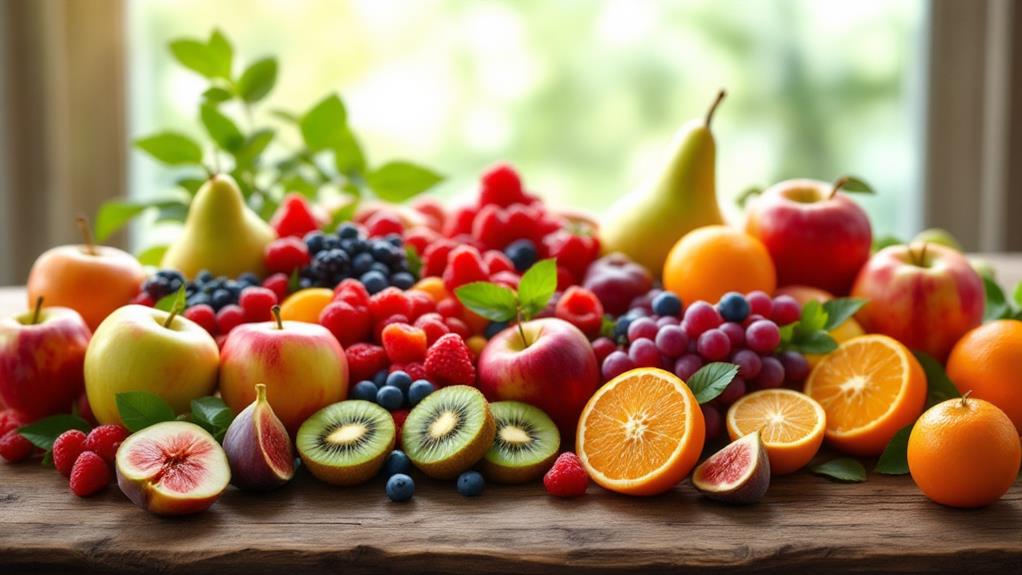
Incorporating high-fiber fruits into your diet is an excellent way to enhance overall well-being and meet your fiber goals. Try passion fruits, which offer a whopping 24.5 grams of fiber per cup, or avocados, which pack 10 grams per cup while being low in sugar. Raspberries and guava are also excellent choices, each providing around 8 grams of fiber per cup. Don't overlook dried fruits like figs and apricots, which are convenient and fiber-rich options. Including these fruits in your meals can promote heart health, better digestion, and weight management. Uncover more about these powerhouse fruits to amplify your health expedition.
Understanding Dietary Fiber
Dietary fiber might seem like just another component of your diet, but it plays an indispensable role in maintaining your digestive health. You might wonder why fiber is so important. It all comes down to the fact that dietary fiber, a type of carbohydrate your body can't digest, is classified into soluble and insoluble fiber. Each type performs unique functions that contribute greatly to your well-being. Soluble fiber can help lower cholesterol levels and regulate blood sugar, while insoluble fiber aids in bowel regularity by adding bulk to stool.
To reap these benefits, it's crucial to meet the recommended daily fiber intake—about 25 grams for women and 38 grams for men. Unfortunately, most people fall short, averaging just 15 grams a day. By incorporating high-fiber foods like fruits and vegetables, whole grains, and legumes into your meals, you can bridge this gap. These foods not only improve digestive health but also support a healthy weight and provide necessary nutrients. Emphasizing these choices in your diet guarantees you're not just meeting your fiber needs but also enhancing your overall well-being. So, start making small changes today for lasting benefits.
Health Benefits of Fiber
Embracing a diet rich in fiber can greatly improve your general health. By supporting your digestive system, fiber promotes gut health and helps maintain regular bowel movements, preventing constipation. Including high-fiber fruits in your meals aligns with dietary guidelines and guarantees a balanced intake, which is essential for comprehensive well-being.
Fiber also plays a significant role in blood sugar regulation. It slows glucose absorption, helping to prevent insulin resistance. This is particularly beneficial if you're managing diabetes or prediabetes. Additionally, a high-fiber diet can help you manage your weight. It boosts feelings of fullness, reducing total calorie consumption and making weight management more attainable.
Furthermore, fiber intake is associated with a reduced risk of heart disease. Soluble fiber helps lower LDL cholesterol levels, blood pressure, and inflammation, contributing to a healthier heart. High-fiber diets are often linked to a lower risk of certain cancers, such as colorectal cancer, due to their positive impact on the gut microbiome.
Top High-Fiber Fruits
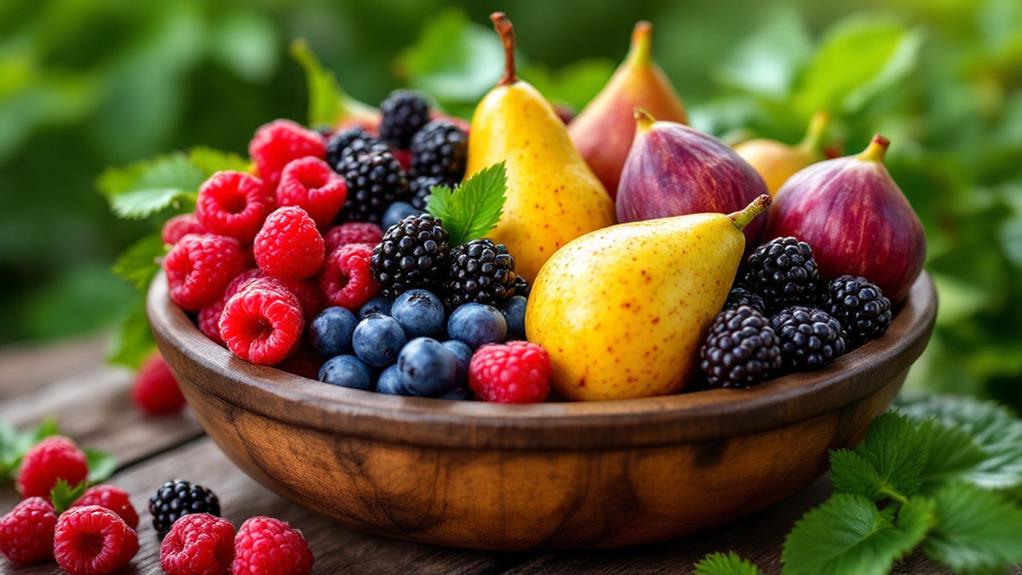
When you're looking to improve your fiber intake, several fruits stand out as top choices. Passion fruit tops the list with an impressive 24.5 grams of fiber per cup. It's an excellent choice for greatly increasing your dietary fiber. Raspberries, offering about 8 grams of fiber per cup, are another fantastic option. They're packed with antioxidants, supporting digestive health and general wellness.
Guava is also a high-fiber fruit, providing approximately 8.9 grams of fiber per cup. It's not just a fiber powerhouse but also a great source of vitamin C, promoting extra health benefits. Meanwhile, avocados offer a unique combination of about 10 grams of fiber per cup and healthy fats, which are beneficial for heart health. Their creamy texture and versatility make them easy to incorporate into different meals.
Don't overlook pears, which supply nearly 6 grams of fiber per medium-sized fruit. Eating them with the skin improves their benefits, aiding in digestion. By incorporating these high-fiber fruits into your diet, you're not only increasing your fiber intake but also reaping numerous health advantages, contributing to better general wellness.
Low-Sugar, High-Fiber Options
If you're aiming to improve your fiber intake without piling on the sugar, there are several fruits worth considering. Avocados top the list with a mere 0.5 grams of sugar per fruit and an impressive 10 grams of fiber per cup. This makes them a fantastic low-sugar, high-fiber option for increasing dietary fiber. Next, consider raspberries, which pack 8 grams of fiber per cup while keeping sugar content to just 5 grams. They're an excellent choice if you're focusing on a low-sugar diet.
Blackberries also deserve a spot in your fruit bowl, offering 7 grams of fiber and just 7 grams of sugar per cup. They provide a sweet yet healthy option for your fiber intake needs. Strawberries are another fruit to include; with 3 grams of fiber and 8 grams of sugar per cup, they're a moderately low-sugar choice that can still contribute to your fiber goals. Finally, while oranges provide 3 grams of fiber per medium fruit, they do have 13 grams of sugar. Despite the higher sugar content, they still offer beneficial fiber and can be enjoyed in moderation.
Benefits of Dried Fruits
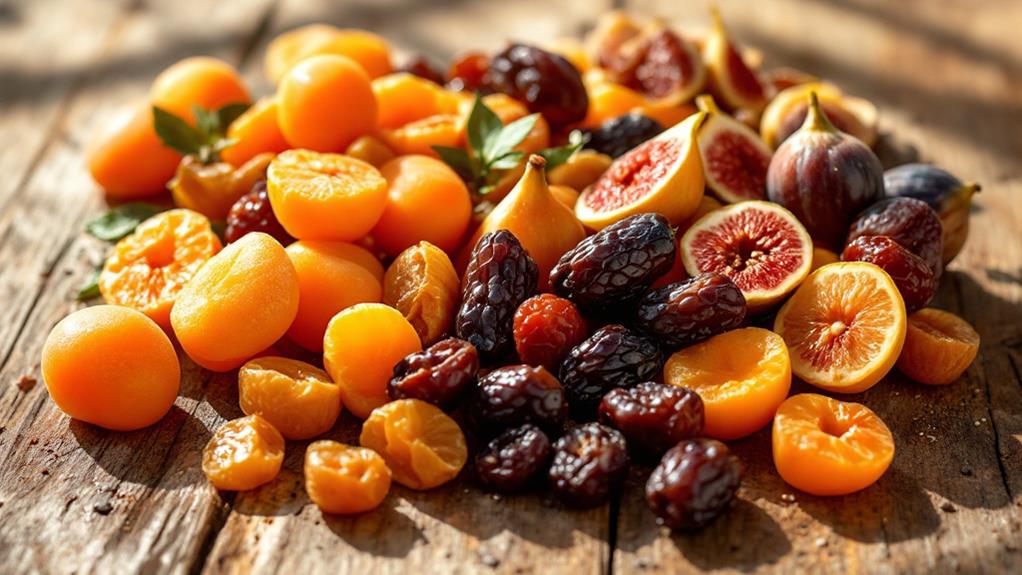
While fresh fruits are often celebrated for their fiber content, dried fruits offer a concentrated source that's hard to beat. For instance, dried figs and apricots pack around 7-9 grams of fiber per 1/4 cup. This makes them an efficient way to elevate your daily fiber intake. The fiber in dried fruits supports digestive health and promotes regular bowel movements, helping prevent constipation.
Dried fruits serve as a convenient option for a portable snack. They're easy to carry and can satisfy cravings while adding nutritional value to your diet. However, you need to be mindful of portion sizes. Because dried fruits are denser, they contain more calories compared to fresh fruits. Overconsumption can lead to excessive calorie intake, which might counteract your health goals.
Another factor to reflect on is added sugars. Many commercially available dried fruits contain these, which can increase calorie consumption unnecessarily. Opt for unsweetened varieties to optimize health benefits without the extra sugar. By doing so, you can enjoy the natural sweetness of dried fruits while still reaping their fiber-rich benefits. Choosing the right types and portions allows you to improve your diet effectively, keeping it both nutritious and delicious.
Daily Fruit Recommendations
Recognizing the importance of fruits in your diet is vital for maintaining good health, as they're a key source of fiber, vitamins, and minerals. The Dietary Guidelines suggest you consume 2 cups of fruit daily. Depending on your choices, this can provide between 4 to 20 grams of fiber, greatly contributing to your daily requirements. Opting for whole fruits over juices is beneficial as whole fruits contain more fiber and fewer sugars, promoting better health outcomes.
To effectively enhance fiber intake, include high-fiber fruits like raspberries, which offer 8 grams per cup, or pears, providing 5.5 grams per medium fruit. These foods not only help elevate your fiber intake but also enrich your diet with vital nutrients. Incorporating a variety of fruits guarantees you get a wide range of vitamins, minerals, and antioxidants that support comprehensive health.
Meeting the daily fiber recommendation of 25 grams for women and 38 grams for men can be more manageable by including fruits in every meal and snack. This strategy will help you maintain a balanced diet, optimizing both your fiber intake and general nutritional health.
Fiber in Weight Management
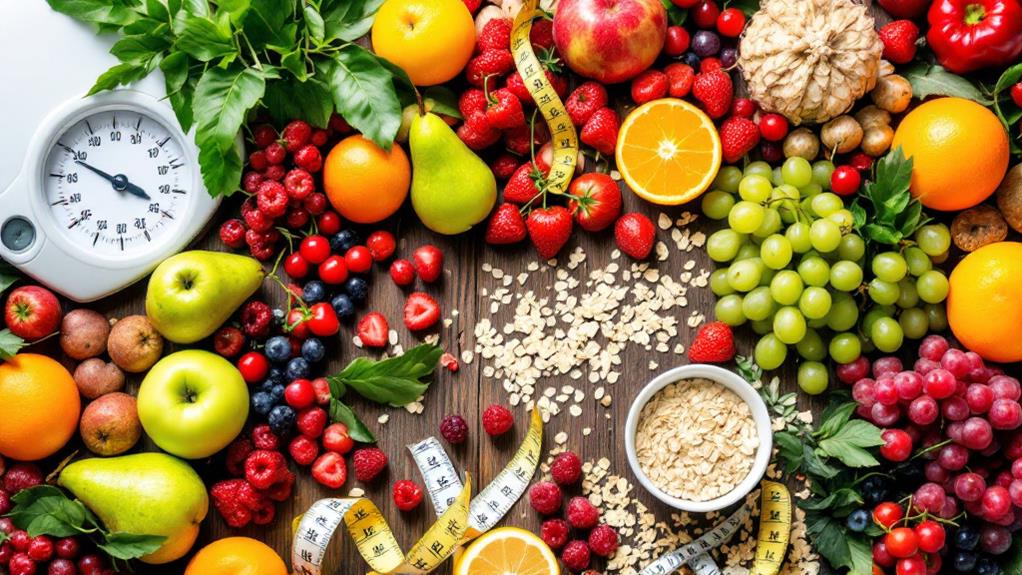
Incorporating fruits into your diet not only improves your fiber intake but also plays a notable role in weight management. High-fiber foods, like fruits high in fiber, encourage feelings of fullness, which can help reduce your total calorie intake and assist in weight loss efforts. When you eat fiber-rich foods, digestion slows down, providing sustained energy levels and helping regulate appetite. This control over cravings can be vital in maintaining a lower body weight.
A fiber-rich diet often leads to a healthier body weight because individuals tend to consume fewer calories. For example, adding fruits like raspberries, with 8 grams of fiber per cup, and pears, which offer 5.5 grams per medium pear, considerably contributes to your daily fiber intake. This helps in supporting effective weight management.
Studies suggest that those who consume more fiber have a healthier body weight and lower rates of obesity-related diseases. By choosing high-fiber fruits, you foster appetite control and promote a healthy body weight. Ultimately, increasing your fiber intake through fruits isn't just about digestion; it's an important strategy for effective weight management.
Fiber's Impact on Heart Health
A high-fiber diet is a heart-health powerhouse, especially when it comes from soluble fiber in fruits. Soluble fiber plays a vital role in lowering LDL cholesterol levels, which is a significant factor in reducing the risk of cardiovascular disease. By incorporating fruits like avocados and berries into your diet, you not only increase your fiber intake but also benefit from heart-healthy fats and antioxidants that improve heart health outcomes.
Consuming the recommended 25-30 grams of fiber daily is linked to a 29% lower risk of cardiovascular disease. This highlights the significance of fiber-rich foods in promoting heart health. The soluble fiber found in many fruits helps regulate blood pressure and reduce inflammation, two essential factors in maintaining a healthy cardiovascular system. Studies consistently show that individuals with higher fiber intake from fruits experience fewer heart-related issues compared to those with lower fiber consumption.
To enhance your heart health, make sure you're eating a variety of fiber-rich fruits. Not only will this help you manage cholesterol levels, but it will also support comprehensive cardiovascular health by keeping inflammation at bay and blood pressure in check. Prioritizing fiber is a simple yet effective way to protect your heart.
Managing Blood Sugar With Fiber
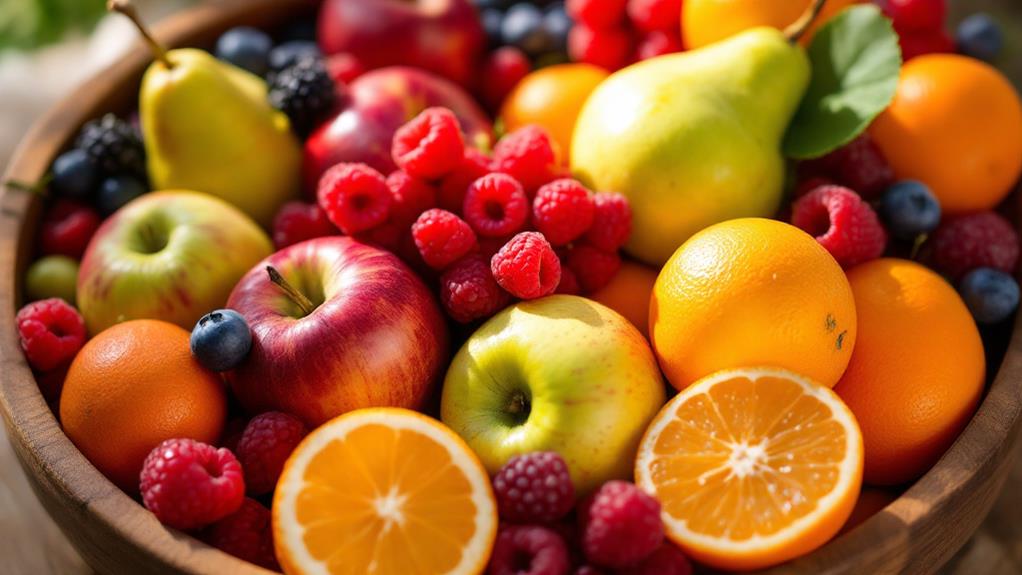
While a high-fiber diet is great for heart health, it also plays a vital role in managing blood sugar levels. By slowing down the digestion and absorption of carbohydrates, fiber helps stabilize blood sugar and prevent spikes after meals. High-fiber fruits, particularly those rich in soluble fiber like apples, oranges, and berries, are key players in this process. Soluble fiber forms a gel-like substance in your digestive tract, contributing to slower glucose absorption and improved glycemic control.
Including fruits such as raspberries and pears in your diet can improve insulin sensitivity, essential for reducing the risk of Type 2 diabetes. Following dietary guidelines that recommend at least 28 grams of fiber daily can greatly lower blood sugar levels and improve glycemic control, especially if you have prediabetes or diabetes. High-fiber fruits not only aid in blood sugar management but also promote a feeling of fullness. This satiety can help reduce total calorie intake, supporting weight management—another significant factor in regulating blood sugar.

